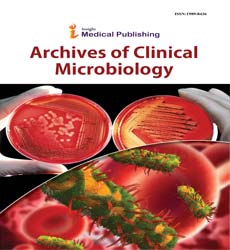Abstract
Mode of Action of MCB3681 in Staphylococcus aureus a Proteomic Study
Background: MCB3681, a novel quinolonyl-oxazolidinone antibacterial, is active against quinolone- and/or linezolidresistant Gram-positive bacteria. Thus, MCB3681 may interact with other targets than quinolones and oxazolidinones.
Methods and Findings: Protein expression in S. aureus following short-term exposure to MCB3681 was analyzed using 2D-gel electrophoresis and MALDI-TOF-MS/MS. Synthesis of 13 and 16 proteins was induced or repressed, respectively. Among the induced proteins are four ribosomal proteins. Repressed are proteins from different amino acid synthesis pathways, two aminoacyl-tRNAsynthetases, and methicillin-resistance-factor-protein FemB.
Conclusion: Our findings demonstrate that the impact of MCB3681 on the proteome signature of treated S. aureus cells is different from that of either ciprofloxacin or linezolid.
Author(s):
Birgit Voigt, Dirk Albrecht and Axel Dalhoff
Abstract | Full-Text | PDF
Share this

Abstracted/Indexed in
- Google Scholar
- Open J Gate
- Genamics JournalSeek
- The Global Impact Factor (GIF)
- Open Archive Initiative
- China National Knowledge Infrastructure (CNKI)
- Scimago
- Directory of Research Journal Indexing (DRJI)
- WorldCat
- Proquest Summons
- Publons
- MIAR
- ResearchGate
- University Grants Commission
- Geneva Foundation for Medical Education and Research
- Secret Search Engine Labs
Open Access Journals
- Aquaculture & Veterinary Science
- Chemistry & Chemical Sciences
- Clinical Sciences
- Engineering
- General Science
- Genetics & Molecular Biology
- Health Care & Nursing
- Immunology & Microbiology
- Materials Science
- Mathematics & Physics
- Medical Sciences
- Neurology & Psychiatry
- Oncology & Cancer Science
- Pharmaceutical Sciences

